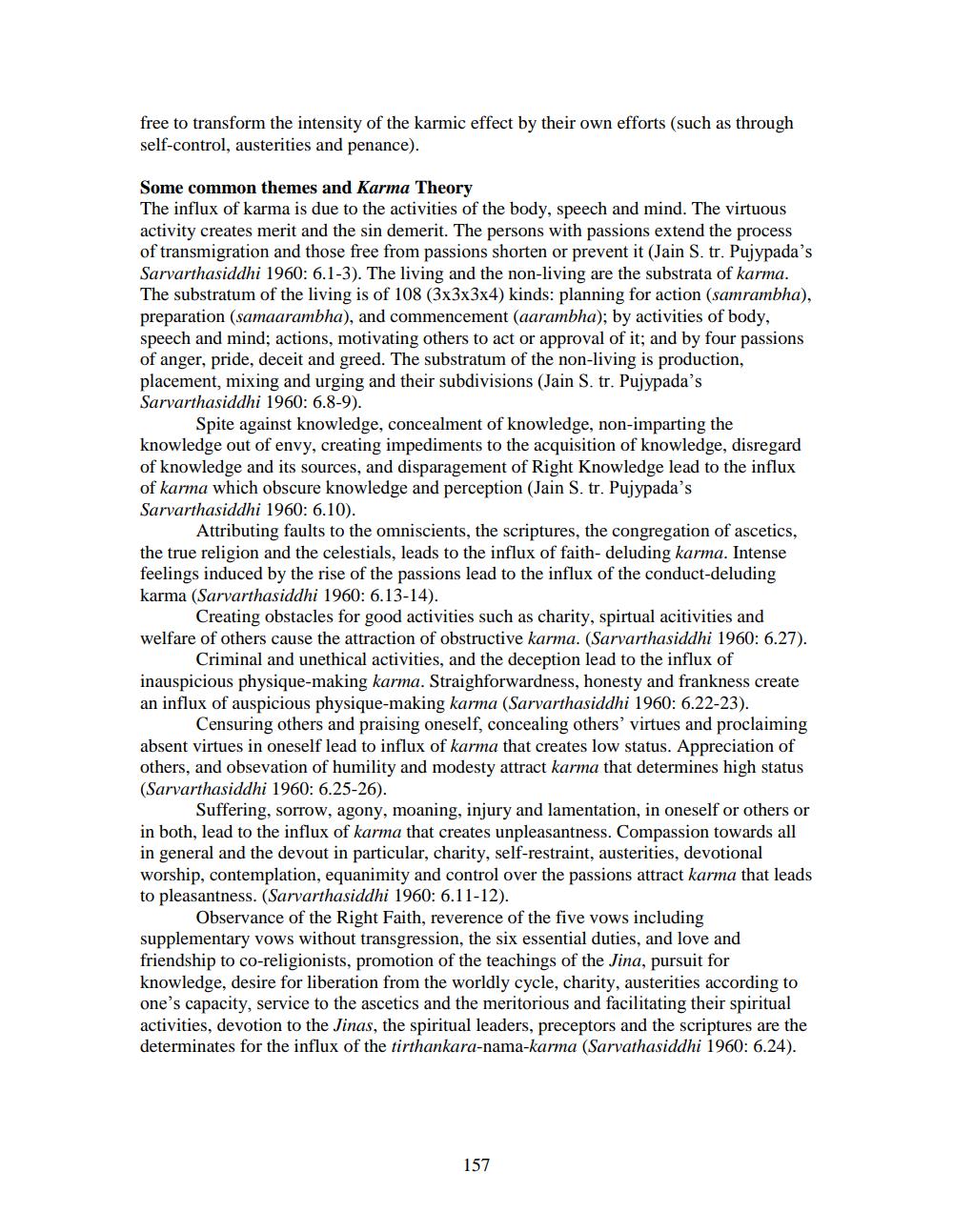________________
free to transform the intensity of the karmic effect by their own efforts (such as through self-control, austerities and penance).
Some common themes and Karma Theory The influx of karma is due to the activities of the body, speech and mind. The virtuous activity creates merit and the sin demerit. The persons with passions extend the process of transmigration and those free from passions shorten or prevent it (Jain S. tr. Pujypada's Sarvarthasiddhi 1960: 6.1-3). The living and the non-living are the substrata of karma. The substratum of the living is of 108 (3x3x3x4) kinds: planning for action (samrambha), preparation (samaarambha), and commencement (aarambha); by activities of body, speech and mind; actions, motivating others to act or approval of it, and by four passions of anger, pride, deceit and greed. The substratum of the non-living is production, placement, mixing and urging and their subdivisions (Jain S. tr. Pujypada's Sarvarthasiddhi 1960: 6.8-9).
Spite against knowledge, concealment of knowledge, non-imparting the knowledge out of envy, creating impediments to the acquisition of knowledge, disregard of knowledge and its sources, and disparagement of Right Knowledge lead to the influx of karma which obscure knowledge and perception (Jain S. tr. Pujypada's Sarvarthasiddhi 1960: 6.10).
Attributing faults to the omniscients, the scriptures, the congregation of ascetics, the true religion and the celestials, leads to the influx of faith- deluding karma. Intense feelings induced by the rise of the passions lead to the influx of the conduct-deluding karma (Sarvarthasiddhi 1960: 6.13-14).
Creating obstacles for good activities such as charity, spirtual acitivities and welfare of others cause the attraction of obstructive karma. (Sarvarthasiddhi 1960: 6.27).
Criminal and unethical activities, and the deception lead to the influx of inauspicious physique-making karma. Straighforwardness, honesty and frankness create an influx of auspicious physique-making karma (Sarvarthasiddhi 1960: 6.22-23).
Censuring others and praising oneself, concealing others' virtues and proclaiming absent virtues in oneself lead to influx of karma that creates low status. Appreciation of others, and obsevation of humility and modesty attract karma that determines high status (Sarvarthasiddhi 1960: 6.25-26).
Suffering, sorrow, agony, moaning, injury and lamentation, in oneself or others or in both, lead to the influx of karma that creates unpleasantness. Compassion towards all in general and the devout in particular, charity, self-restraint, austerities, devotional worship, contemplation, equanimity and control over the passions attract karma that leads to pleasantness. (Sarvarthasiddhi 1960: 6.11-12).
Observance of the Right Faith, reverence of the five vows including supplementary vows without transgression, the six essential duties, and love and friendship to co-religionists, promotion of the teachings of the Jina, pursuit for knowledge, desire for liberation from the worldly cycle, charity, austerities according to one's capacity, service to the ascetics and the meritorious and facilitating their spiritual activities, devotion to the Jinas, the spiritual leaders, preceptors and the scriptures are the determinates for the influx of the tirthankara-nama-karma (Sarvathasiddhi 1960: 6.24).
157




